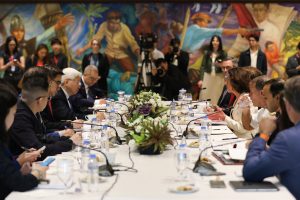A number of leading American corporations are set to announce more than $1 billion in investments in the Philippines, U.S. Commerce Secretary Gina Raimondo said yesterday.
Raimondo made the comments while on a two-day trade and investment mission to the Philippines along with executives from 22 companies, including United Airlines, Google, Visa, Mastercard, Bechtel, and Microsoft.
Speaking to the press in Manila yesterday, Reuters reported, Raimondo said that Washington was committed to expanding trade and investment in the Philippines as part of the Indo-Pacific Economic Framework, the economic adjunct to its Indo-Pacific strategy. The investments will be in a range of sectors, including electric vehicles, solar energy, and digitization, she added.
“The U.S.-Philippine alliance is ironclad,” Raimondo said at the press briefing, which followed a meeting with President Ferdinand Marcos Jr. at the Malacañang Palace, The Associated Press reported. “It is sustained over 72 years and we remain steadfast friends and increasingly partners in prosperity.”
Raimondo also held talks with Philippine Secretary of Trade and Industry Alfredo Pascual and Frederick Go, the special assistant to the president for investment and economic affairs.
In an earlier statement, the White House said that Raimondo’s mission, which comes to an end today, would “enhance U.S. companies’ contributions to the Philippines’ innovation economy, connective infrastructure, clean energy transition, critical minerals sector, and the food security of its people.”
Raimondo’s announcement is a clear sign that the Biden administration is seeking to upgrade and augment its economic ties with the Philippines, after two years that have seen several leaps forward in the security relationship between the two countries. Since Marcos took office in July 2022, his administration has expanded U.S. access to Philippine military facilities under the 2014 Enhanced Defense Cooperation Agreement, and taken part in several joint maritime patrols with the U.S., including in disputed parts of the South China Sea.
The background to this has been the growing frequency and intensity of Chinese incursions into areas of the South China Sea claimed by the Philippines. These have resulted in a series of dangerous high-seas encounters, including, most recently, the China Coast Guard’s ramming of a Philippine Coast Guard vessel.
Yesterday, Raimondo added that Marcos has praised his nation’s close relations with Washington during their meeting, and quoted him as saying “he cannot imagine the Philippines’ future without a close bond with the United States.”
“I want to say here today, the feeling is mutual,” Raimondo added, “but President Biden acknowledges we can do more.
During her press briefing, Raimondo also spoke about U.S. attempts to prevent China from acquiring advanced computer chips and manufacturing equipment that could be used to augment its military power. She said that the Biden administration was assessing the need to expand its regime of export controls.
“My job is to protect the American people and to make sure that our most sophisticated technology, including semiconductor technology, artificial intelligence technology that we have and China doesn’t have, that they can’t access it and use it to enable the Chinese military,” Raimondo said.

































